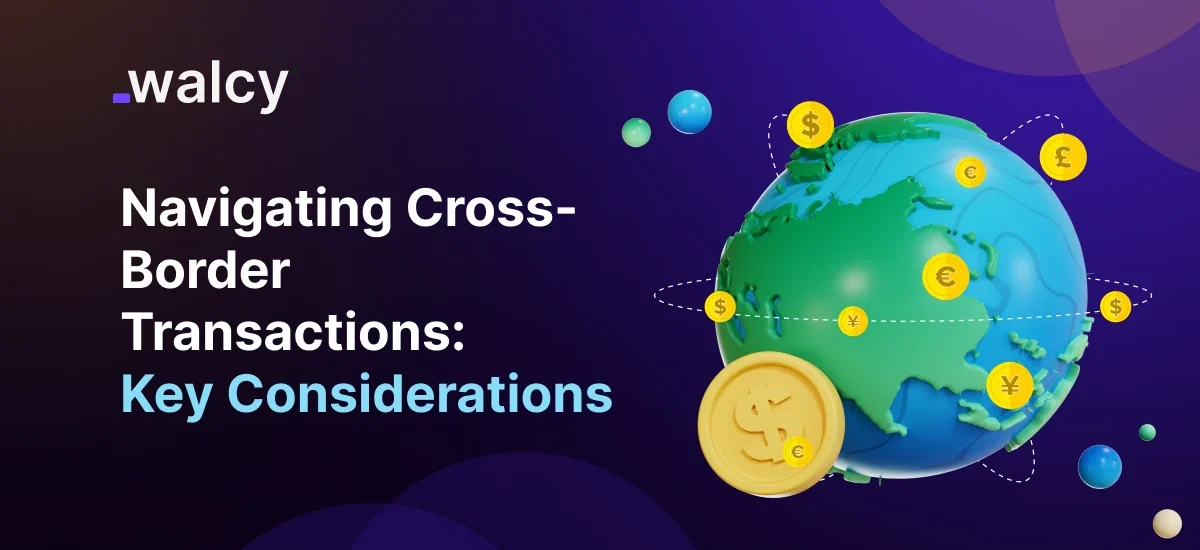Cross-border transactions have cropped up as an indispensable part of international trade. Be it those petty businesses sourcing their products from manufacturers across borders or the large multinational organizations operating in several countries around the world, today cross-border transactions assume importance in a wide range of business transactions.
These transactions pose unique challenges in that more than a few laws, regulatory regimes, and logistical considerations come into play that may differ from those associated with purely domestic transactions.
This article will highlight some of the key areas for consideration by business entities involved in cross-border transactions explain legal requirements and understand issues that concern currency exchange, taxation, and all other important factors in global trade.
Understanding Cross-Border Transactions
In the modern world, cross-border transactions generally denote all financial activities between businesses, individuals, or organizations across countries. It may include the purchase and sale of goods and services, investments, and payment for intellectual rights.
A cross-border transaction therefore entails opportunities for business enterprises to be able to reach updated markets, reach a wider clientele base, and conduct more competitive supply chains. It comes, however, with peculiar challenges that require painstaking planning and a deep understanding of many variables.
Read about: Ultimate Guide To B2B International Payments In 2024.
Types of Cross-Border Transactions
There are numerous kinds of cross-border transactions that a business may involve itself in, each with its considerations particular to it. Some of these include:
Trade Transactions:
These involve the importation and exportation of goods and services across two or more borders. Firms have to address the shipping logistics as well as customs duties and tariffs, which mostly are imposed by agreements between different countries in international trade.
Investment transactions:
It involve cross-border investments that can be invested in through the purchase of assets, stocks, and securities in foreign companies. This transaction provides a means whereby firms may enter new markets and realize fresh opportunities for growth in understanding the legal regulations between home and host countries.
Licensing and IP Transactions:
Companies entering cross-border licensing would either be selling or buying the rights to use intellectual property like patents, trademarks, and copyrights. An understanding of the state of international IP laws is required, together with ways and means of protection available within different jurisdictions.
Mergers and Acquisitions Transactions:
Cross-border merger and acquisition transactions are either the sale of a company in another country or the combination between two companies in different countries. These mergers and acquisitions also can be quite complicated and subject to government regulatory approval including anti-trust approval from both countries.
Key Issues to Cross-Border Transactions
While such cross-border transactions offer scope for expansion and growth, they equally offer a host of problems that, if not properly managed, might impede business success. Some of the key issues that need to be addressed by enterprises during cross-border business are given below:
-
Law on Cross-Border Transactions
The most bewildering challenge that businesses may go through is finding out how to handle the legal agenda correctly in cross-border transactions. Since each country has a set of laws and regulations that guide international trade, investment, and financial flows, fines, legal penalties, or reputational consequences due to the inability to act by such laws may arise. Following are some points from the legal point of view:
Contract Law:
For cross-border trades, to be extra cautious, an explicit valid contract is desirable. Contracts must include specifics on the legal systems of the two nations, including which law will apply to the agreement and the dispute resolution procedure.
International Trade Agreements:
Most countries have signed international agreements on trade, spelling out the tariffs, duties, and other related trade matters. Knowing these will further enable businesses to enjoy low duties and sometimes simplify customs clearance.
Compliance with the local laws:
Besides international law that deals with trade, the business is obliged also to accommodate all the applicable local laws in every country wherever it may be set up. This shall include labor laws, environment regulations, consumer protection laws, and anti-bribery laws amongst many other local laws.
Intellectual Property Protection:
A firm’s intellectual property rights vary from country to country, and thus the firm should make sure that its rights are protected in each country where operations are located. Many times this requires filing for trademark or patent protection in another country to prevent the unauthorized use of its IP.
-
Currency Exchange and Foreign Exchange Risk
Management from the exchange perspective becomes one of the major issues associated with the transactions that occur across borders. While going into business transactions in different countries, most of the firms go into dealing with various types of currencies that are subject to change based on market conditions. This introduces foreign exchange risk where changes in the currency values alter transaction profitability.
Fluctuations in Exchange Rates: Within the period of the short-run, the rate of exchange can show a wild variation; in the case of a business firm, it may suffer losses when, in some period between negotiation and real transaction, the value of a certain currency goes down. Some companies try to avoid such kinds of risks by applying financial instruments like a forward contract, which can set the exchange rate for some future date, or hedging strategies protecting from unfavorable movements of currency.
Read about: Top Factors Affecting Foreign Exchange Rates in 2024.
Multi-Currency Account: Since your business is so involved in dealing with a lot of currencies, opening an account for multiple currencies will enable it to operate several types under the same roof. It would mean easy receipt and payout across borders with reduced currency conversion costs.
Read more about: Best Multicurrency Account: What Is It And How It Works?
-
Cross Border Taxation and Compliance
With cross-border transactions come some complex issues of taxation where a business has to bear the tax laws of its home country as well as the foreign country where it is establishing its business. If not dealt with appropriately, one may fall into a case of double taxation, fines, or some other problem regarding law and taxes. Some of the tax considerations are:
DTAs:
These represent a few agreements between nations to avoid double taxation by specification of where certain incomes should be subjected to tax. This will help the enterprise to understand and avoid situations of paying taxes twice for the same income.
Transfer Pricing:
In simple words, the concept of transfer pricing is applied to determining the price of merchandise, services, or intangible property transferred across subsidiaries residing in different countries by international companies. The concept of transfer pricing, normally scrutinized by tax authorities, makes certain that such firms do not shift their profits artificially to low-tax jurisdictions.
Value-added taxes-VAT, and goods and services tax-GST:
Nearly all countries assess VAT or GST on the sale of most goods and services. For that matter, each group company is supposed to comply with the respective country’s VAT/GST requirements where the operating business is found, each in light of the local tax laws.
Tax reporting and documentation:
Apart from cross-border transactions, they issue additional tax reporting and documentation to satisfy the necessities of both the home and foreign country tax authorities. The companies involved in business under such trades must keep regular records concerning the transactions occurring across the border to be compliant with any type of tax liability.
-
Mode of Payment and Settlement
The payment option is one of the keys to cross-border transactions. Each firm needs to find out the speed, cost, and safety of different payment options available and customers’ and suppliers’ preferences in each country. Means of payment in common usage include:
Transfers through banks:
Bank transfers are made in an increasing number of cross-border transactions, but they may be rather slow and fairly expensive, especially if the transfer is between accounts of different currencies.
Letter of Credits:
One of the critical usages in foreign trade is a letter of credit. With the support of this letter, can be utilized to ensure that the settlement of a payment between two parties has been done. The LC is the assurance from the buyer’s bank to render the payment against the seller upon the fulfillment of pre-defined conditions.
E-payment Gateways:
Payment through e-channels via different platforms like PayPal, Stripe, and even Transfer Wise, was promised to be much quicker, highly secure, and affordable in cross-border money transfers. Most importantly, the aforementioned facilities had been in maximum requirement for small and medium-scale enterprises.
Recently, some companies have started to use cryptocurrency to settle cross-border transactions. Cryptocurrencies such as Bitcoin may offer better fees and faster settlement times but are notoriously volatile and forever doomed to sit in regulatory limbo.
You might like: Outlining The Latest Cross-Border Payment Trends
-
Logistics and Supply Chain Management
International physical movements from one country to another have a high level of logistical management, with attention to minute details in the supply chain. Companies deal with customs procedures, regulations concerning import and export, and transportation problems just to make timely and quality delivery effective.
Documentation of Customs Procedures:
Importation and exportation of goods across borders are governed by various customs regulations that change from one country to another. It is the concern and responsibility of the business to understand the documentation requirements, tariffs, and duties related to its products, and appreciate the compliance matters arising out of customs procedures.
Incoterms:
They are standard terms appearing in international trade contracts. They are applied in determining buyers’ and sellers’ responsibilities for delivering goods. Furthermore, in this context, it is of utmost relevance to be adequately informed about the Incoterm concept, as in this way the interested parties will have an opportunity to ensure that the responsibilities are shared concerning shipping, insurance, and customs duties.
Transport and Shipping:
In most cross-border shipments, more than one mode of transport is necessarily involved, such as air, sea, and land. Companies have to undertake appropriate planning of logistics related to shipping with utmost care so that goods can be delivered efficiently as well as economically.
Read more: What is an Import-Export Code (IEC): Why is it Important?
-
Problems in Cross-Border Transactions
Cross-border transactions come with special challenges that businesses must respond to if they are to emerge successful in the global marketplace. Some of the most common challenges involve
Cultural Differences:
The company needs to do cross-border business in an environment that has cultural differences in styles of communication and negotiation, as well as in conducting business. Understanding and respect for such differences build strong relationships with foreign partners and customers.
Political and economic stability:
The political and economic stability of the countries where any cross-border transaction is taken up determines its success or failure. Businesses have to consider the risks of conducting business in a country with unstable political or economic conditions.
Language Barriers:
Languages also make the task of communication and negotiation of contracts more difficult. Companies should be alert to the loose wordings in either of the languages; professional translation services if necessary, may be employed.
Regulatory Changes:
The regulatory environment can also change fast, especially in emerging markets. Firms have to keep track of changes in laws and rules that relate to their cross-border business.
You shall like: Expanding Business Internationally: Must Know Things
-
Strategies of Cross-border Business
Businesses should, therefore, look towards practices that reduce risks yet allow opportunities for the success of cross-border transactions. Such strategies include;
Detailed Market Research:
It is prudent and always a good idea for businesses to do detailed market research before venturing into new markets to understand such aspects as the regulatory environment, consumer preference, and competition.
Building Stronger Relationships with Partners:
Stronger relationships with local partners-suppliers, distributors, and even legal advisers-can go a long way in helping businesses negotiate various complexities associated with cross-border transactions.
Outsourcing Supply Chains:
Diversification of supply chains across large numbers of countries can reduce risks of disruption that may arise because of political or economic instability in any one country.
Leverage Technology:
Technology will make cross-border transactions easier to conduct, as it ensures foreign currency exchange handling more easily or prepares and files value-added tax returns automatically. Investment in the right digital tools and platforms creates more efficiency, along with mitigating a lot of risks associated with cross-border transactions.
Read more about: GST For Foreign Exchange Transaction? Must Know Things.
Conclusion
Cross-border transactions form a very important part of international business, opening up unparalleled opportunities for growth, expansion, and innovation. They share challenges that are very specific about legal, financial, and logistical matters that call for super planning.
A firm trading internationally would be adequately prepared to deal with the complexities of the same trade if it were well conversant with the law relating to cross-border transactions, managed the foreign exchange risk, complied with the requisite regulations, and availed itself of efficient solutions for payment and logistics.
You shall love: All About Overseas Payments (2024); Comprehensive Guide



